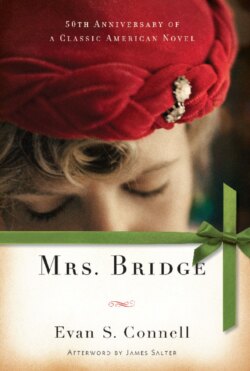Читать книгу Mrs. Bridge - Evan S. Connell - Страница 13
На сайте Литреса книга снята с продажи.
Оглавление7 • ALICE JONES
That summer Carolyn began playing with Alice Jones, the daughter of the colored gardener who worked next door. Every Saturday morning he would appear from the direction of the streetcar line, his daughter Alice capering wildly around him. As soon as they came in sight of the Bridges’ house she would rush ahead, pigtails flying. In a minute she would be at the back door, pressing the bell with both hands. Often Mrs. Bridge would be in the kitchen polishing silver or planning the week-end menu while Harriet did the heavy cleaning somewhere else in the house, so Mrs. Bridge would answer the door.
Alice Jones was always out of breath from the run and her eyes were shining with expectation as she inquired if Corky could come out and play.
“Why, I think she can,” Mrs. Bridge would say, and smile. “Providing you two behave yourselves.” About this time the gardener would come walking up the neighbor’s driveway and she would say through the screen door, “Good morning, Jones.”
“Mornin’, Mrs. Bridge,” he always answered. “That child bothering you all?”
“Not a bit! We love having her.”
By this time Carolyn would appear and the two children would begin their day. In spite of Carolyn’s excellence at school she was not very imaginative, and no matter what she suggested they do that day Alice Jones had a better idea. Carolyn was a little stunned by some of the suggestions, and for a few minutes would grow petulant and arrogant, but when she found that Alice could not be intimidated she gave way and enjoyed herself.
One morning they decided to take apart the radio-phonograph and talk to the little people inside the cabinet; another morning they made sandwiches and filled a Thermos jug with milk because they planned to leave on a trip to Cedar Rabbits, Iowa. Again, they composed a long cheerful letter to Sears, Roebuck & Co. in which Alice told how she murdered people. Some Saturdays they would stage extremely dramatic plays which went on for hours—with time out for other games—the leading part always being taken by Alice Jones because, at her grade school in the north end of the city, she was invariably the Snow Queen or the Good Fairy or some other personage of equal distinction. Carolyn, whose stage experience had been limited to a Thanksgiving skit in which she had been an onion, seldom objected and in fact had some difficulty keeping up with the plot.
Long before noon they were at the back door, wanting to know if it was not yet lunchtime, and when at last Harriet, or perhaps Mrs. Bridge, set up the breakfast-room table for them they would turn on the radio so that during lunch they might listen to the livestock reports, which Alice Jones found hilarious.
One day a fire truck went by the house and Alice, wagging her head in amazement, exclaimed, “There they go again! Who they going to burn down this time?” Dismayed by the wickedness of the firemen, she rolled her eyes and sighed and helped herself to more caramel pudding.
Mrs. Bridge, who was making up a grocery list, paused and smiled affectionately at both children, pleased that Carolyn was not conscious of the difference between them.
Alice and her father appeared every Saturday, and the two children, occasionally joined by Ruth—who more often spent the day lying on the porch swing—would play together as comfortably as on the first Saturday they met. The gardener never failed to ask Mrs. Bridge if Alice was a nuisance; Mrs. Bridge always smiled and assured him she was not.
For a month each summer the Bridges went to Colorado; they hired Jones for this month to water the grass after he had finished working for the neighbors, and so Alice amused herself on the familiar grounds and frequently asked her father how soon Corky would be back.
“Soon enough,” was his usual reply, but one day he paused, and as if considering the future, he told her, cryptically and a little sadly, “She liable to not come back, child.”
But at last the vacation ended and Carolyn returned, full of sunshine and sophistication.
“The mountains are awfully big,” she said primly, and, echoing her mother, “It was just grand.”
Then Alice Jones said, “You know what I got in this here pocket?”
Carolyn, reluctant to become once more the planet instead of the star, affected disdain.
“Who cares?” she announced, coolly turning away.
“A human gizzard,” murmured Alice with a mysterious expression, and before much longer Carolyn was convinced a summer in Kansas City would have been much more exciting than the mountains. She said as much to her mother, who replied a trifle brusquely, being harried at the moment, “Don’t be silly, dear.” And Mrs. Bridge was about to add that there must be other girls besides Alice to play with, but she did not say this; she hesitated, and said, “Corky, you know perfectly well you enjoyed Colorado.” Soon, she knew, the girls would drift apart. Time would take care of the situation.
